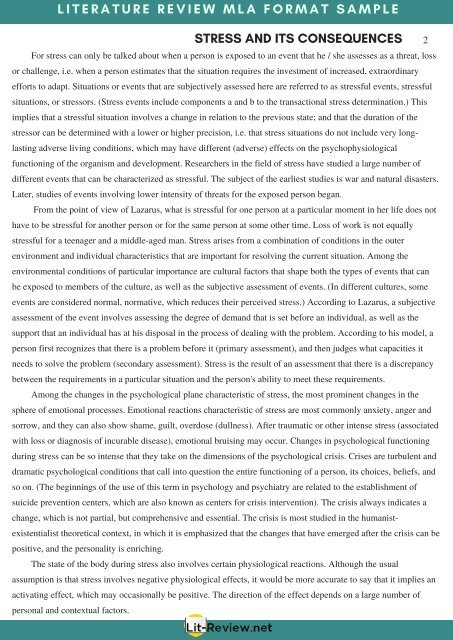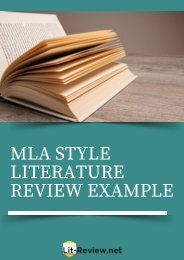Astonishing Sample Literature Review MLA Format
How to get the best astonishing sample literature review MLA format. Geth this info here http://www.lit-review.net/mla-literature-review/
How to get the best astonishing sample literature review MLA format. Geth this info here http://www.lit-review.net/mla-literature-review/
You also want an ePaper? Increase the reach of your titles
YUMPU automatically turns print PDFs into web optimized ePapers that Google loves.
L I T E R A T U R E R E V I E W M L A F O R M A T S A M P L E<br />
STRESS AND ITS CONSEQUENCES 2<br />
For stress can only be talked about when a person is exposed to an event that he / she assesses as a threat, loss<br />
or challenge, i.e. when a person estimates that the situation requires the investment of increased, extraordinary<br />
efforts to adapt. Situations or events that are subjectively assessed here are referred to as stressful events, stressful<br />
situations, or stressors. (Stress events include components a and b to the transactional stress determination.) This<br />
implies that a stressful situation involves a change in relation to the previous state; and that the duration of the<br />
stressor can be determined with a lower or higher precision, i.e. that stress situations do not include very long-<br />
lasting adverse living conditions, which may have different (adverse) effects on the psychophysiological<br />
functioning of the organism and development. Researchers in the field of stress have studied a large number of<br />
different events that can be characterized as stressful. The subject of the earliest studies is war and natural disasters.<br />
Later, studies of events involving lower intensity of threats for the exposed person began.<br />
From the point of view of Lazarus, what is stressful for one person at a particular moment in her life does not<br />
have to be stressful for another person or for the same person at some other time. Loss of work is not equally<br />
stressful for a teenager and a middle-aged man. Stress arises from a combination of conditions in the outer<br />
environment and individual characteristics that are important for resolving the current situation. Among the<br />
environmental conditions of particular importance are cultural factors that shape both the types of events that can<br />
be exposed to members of the culture, as well as the subjective assessment of events. (In different cultures, some<br />
events are considered normal, normative, which reduces their perceived stress.) According to Lazarus, a subjective<br />
assessment of the event involves assessing the degree of demand that is set before an individual, as well as the<br />
support that an individual has at his disposal in the process of dealing with the problem. According to his model, a<br />
person first recognizes that there is a problem before it (primary assessment), and then judges what capacities it<br />
needs to solve the problem (secondary assessment). Stress is the result of an assessment that there is a discrepancy<br />
between the requirements in a particular situation and the person's ability to meet these requirements.<br />
Among the changes in the psychological plane characteristic of stress, the most prominent changes in the<br />
sphere of emotional processes. Emotional reactions characteristic of stress are most commonly anxiety, anger and<br />
sorrow, and they can also show shame, guilt, overdose (dullness). After traumatic or other intense stress (associated<br />
with loss or diagnosis of incurable disease), emotional bruising may occur. Changes in psychological functioning<br />
during stress can be so intense that they take on the dimensions of the psychological crisis. Crises are turbulent and<br />
dramatic psychological conditions that call into question the entire functioning of a person, its choices, beliefs, and<br />
so on. (The beginnings of the use of this term in psychology and psychiatry are related to the establishment of<br />
suicide prevention centers, which are also known as centers for crisis intervention). The crisis always indicates a<br />
change, which is not partial, but comprehensive and essential. The crisis is most studied in the humanist-<br />
existentialist theoretical context, in which it is emphasized that the changes that have emerged after the crisis can be<br />
positive, and the personality is enriching.<br />
The state of the body during stress also involves certain physiological reactions. Although the usual<br />
assumption is that stress involves negative physiological effects, it would be more accurate to say that it implies an<br />
activating effect, which may occasionally be positive. The direction of the effect depends on a large number of<br />
personal and contextual factors.





